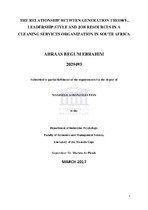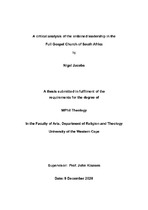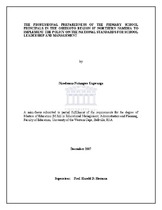Relationship between generation theory, leadership style and job resources in a cleaning services organization in South Africa
Abstract
Purpose - The landscape of the world of work as we know has changed dramatically in the last decade. We have complex organizations compounded by multiple generations co-existing in the workplace. This phenomenon brings about different dynamics in organizations, progressive leaders if understood and managed correctly, could potentially capitalize on. The purpose of this paper is to understand the different generations and whether these generations require different leadership styles. The paper furthermore attempts to investigate whether different generations prefer different job resources. Design/Methodology/Approach – This research study uses a quantitative approach to determine whether there are indeed significant differences between the different generations and the leadership style they prefer as well as the job resources they prefer. Findings - Although no statistically significant differences were found between the different generations and their preferences for the specific leadership styles, the descriptive statistics regarding preference for leadership style across the generations, indicated that individuals from all generations indicated a preference for transformational leadership. Regarding preference for job resource dimensions, the results yielded a statistically significant difference in the preference for Advancement in Generation Y. Originality and Value – This research paper sheds further light on the understanding of different generations namely Baby boomers, Generation X and Generation Y. The paper maps out the preferred leadership style and preferred job resources of generations and allows business leaders an enhanced understanding of their employees.
Related items
Showing items related by title, author, creator and subject.
-
A critical analysis of the ordained leadership in the Full Gospel Church of South Africa
Jacobs, Nigel (University of the Western Cape, 2020)This research stems from a personal internal conflict and concern regarding the impact the local church is making in the community and on its congregational members. Through personal involvement in the Full Gospel Church ... -
Transformational leadership and health related NGOs in Ethiopia: Members' perspectives of their leaders - A case study of Addis Ababa Network of PLHIV Associations (ANOPA+)
Dinbabo, Berhane Tessema (University of the Western cape, 2016)Clarifying the nexus between leadership and organisational effectiveness across the world remains a significant challenge that has raised robust scholarly debate. A wide range of conceptual models have been provided on ... -
The professional preparedness of the primary school principals in the Oshikoto Region of Nothern Namibia to Implement the policy on the National Standards for School Leadership and Management
Uugwanga, Nicodemous Natangwe (University of the Western Cape, 2008)After seventeen years since the apartheid education system was abolished in Namibia, the education system remains stagnant. The government has been spending big budgets on Education. The Ministry of Education introduced ...




